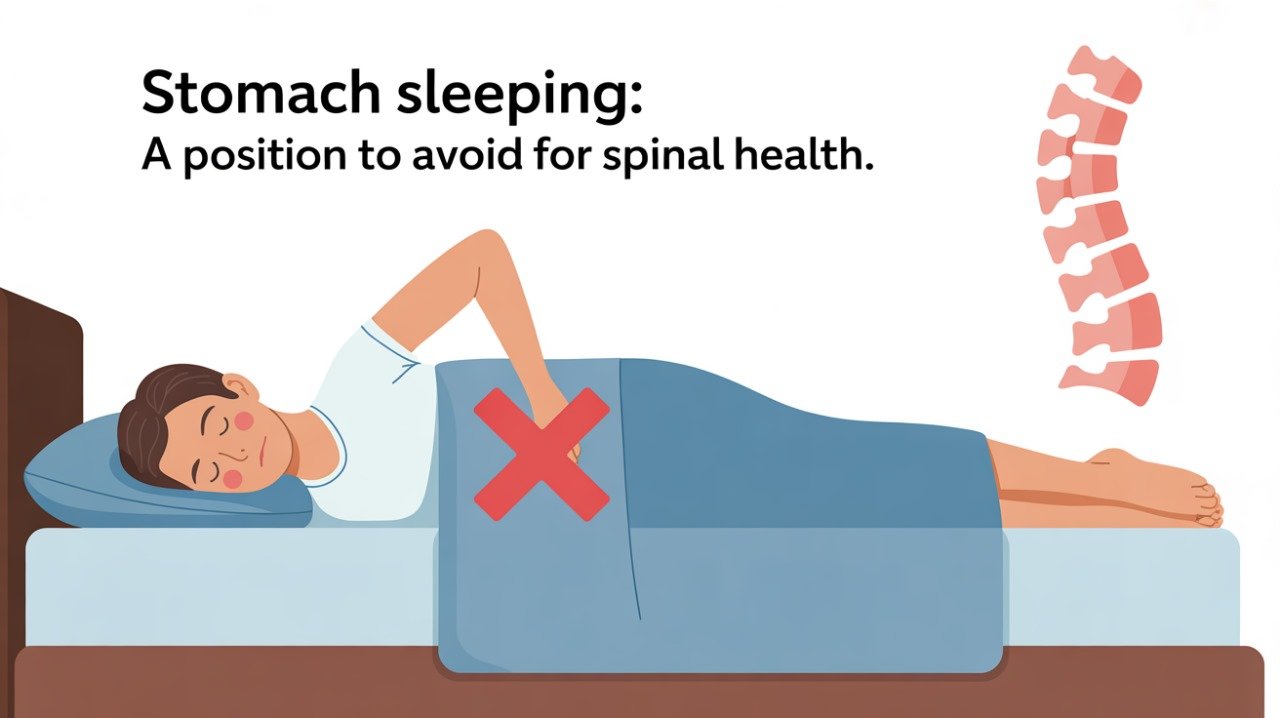

What Your Sleeping Position Reveals About Your Spine Health
Your sleeping posture can silently influence your back comfort, mobility, and long-term spine function. Many patients are surprised to learn that what your sleeping position reveals about your spine health can predict issues like morning stiffness, neck tension, or chronic lower-back pain. At TheSpineClinics, Dr. Priyank Patel emphasizes that improving your sleeping alignment is one of the simplest and most effective steps to maintaining a healthy spine.
The spine naturally curves in three regions—cervical, thoracic, and lumbar. When your posture doesn’t support these curves during sleep, stress builds up in the joints and soft tissues, leading to pain or fatigue. Let’s understand how your sleep positions can either protect or harm your spinal health.

What Sleep Positions Are Best for Spine Health?
Your ideal sleep position should keep the spine in neutral alignment—ears, shoulders, and hips forming one straight line. Side or back sleeping are generally better than lying on your stomach, which twists the neck and compresses the lower back.
The surface you sleep on matters too. A medium-firm mattress and supportive pillow promote natural spinal curvature. Those recovering from injury or surgery should consult a Spine Doctor in Mumbai to assess which position best complements their treatment plan.
Side Sleeping: Benefits and Tips
Side sleeping is often considered the healthiest position for your spine. It aligns the vertebrae and reduces pressure on the lower back. To maximize its benefits, keep a pillow between your knees—this keeps your hips stacked and prevents pelvic rotation.
Side sleeping also helps reduce acid reflux and snoring. Patients with mild lumbar pain often find significant relief after adjusting to this posture. For those recovering from procedures or back conditions, combining proper side posture with gentle stretching can support healing recommended by your Spine Specialist Doctor in Mumbai
Back Sleeping: Benefits and Tips
Lying on your back distributes body weight evenly and minimizes strain on pressure points. To support the lower back, place a small cushion under your knees. Your head pillow should support the neck’s natural curve without pushing it forward.
This position is ideal for maintaining spinal neutrality and easing postural stress, especially for those working long hours at desks. Patients undergoing Best Spine Surgeon in Mumbai often find that this posture promotes gentle healing and helps reduce pain during recovery when advised by their surgeon
Stomach Sleeping: A Position to Avoid for Spinal Health

Although some people find it comforting, sleeping on your stomach is the least spine-friendly position. It flattens the lumbar curve and forces the neck to twist, straining muscles and ligaments. Over time, this can worsen lower-back discomfort or neck stiffness.
If you can’t break the habit, use a very thin pillow (or none) to prevent neck extension. You can also try placing a small cushion under your abdomen to maintain alignment. Many patients consult a Spine Specialist Surgeon in Mumbai to learn ergonomic techniques for breaking poor sleep habits that strain the spine.
Tips for Optimizing Your Sleeping Position
Interestingly, your preferred sleeping position can hint at your stress levels and lifestyle. For instance, fetal sleepers often seek security and comfort, while back sleepers tend to value order and control. Side sleepers are typically balanced and practical.
While these observations aren’t clinical diagnoses, they show how emotional comfort intertwines with physical well-being. Regardless of your personality type, aligning your posture with your spine’s natural curves will always improve sleep quality and spinal resilience.
How Sleeping Positions Relate to Spine Conditions
Poor posture can exacerbate degenerative conditions like spondylosis or disc herniation. Patients often notice worsening morning pain if they sleep with misaligned hips or unsupported necks. In these cases, imaging or physiotherapy may be required to identify structural stress.
Before considering surgery, discuss conservative treatments with your doctor. The Cost of spine surgery in Mumbai varies depending on complexity, hospital facilities, and recovery requirements—but many conditions can improve significantly without surgical intervention through physiotherapy and ergonomics education.
Choosing the Right Expert
If you’ve been struggling with persistent back or neck pain, seek assessment from the top spine surgeon in Mumbai for accurate diagnosis. An experienced surgeon will determine whether your discomfort is muscular, postural, or structural—and guide you toward the right care plan.
Early evaluation can prevent conditions from progressing and avoid unnecessary surgery. Proper diagnostic guidance ensures treatment is both safe and effective for your individual spine health needs.
When Surgery Becomes Necessary
Some conditions like severe disc prolapse or spinal stenosis—may not respond to conservative therapy. In such cases, consulting the right professional for spine surgery in Mumbai is critical. A specialist will recommend minimally invasive options whenever possible, ensuring smaller incisions, quicker recovery, and reduced pain.
Choosing experienced surgeons who prioritize motion preservation and patient education can significantly improve post-surgical satisfaction and long-term outcomes.
Facilities and Post-Operative Care
Recovery quality depends on hospital infrastructure and rehabilitation support. The best Spine Surgery Hospitals in Mumbai offer multidisciplinary care—combining surgical excellence, physiotherapy, and ergonomic counseling under one roof.
Patients benefit from personalized rehabilitation programs that help restore flexibility and confidence post-surgery. Ask your hospital about physiotherapy facilities, infection protocols, and follow-up care before finalizing your treatment.
Posture & Preventive Checkups
Even mild symptoms can indicate early spinal strain. Regular evaluation by a Spine Doctor in Mumbai helps detect subtle misalignments before they develop into chronic pain. Preventive care, posture assessment, and lifestyle modifications can dramatically improve quality of life.
At TheSpineClinics, each consultation focuses on understanding your daily activities, posture habits, and sleep setup—because prevention is far easier than recovery.
Rehabilitation and Specialist Care
Rehabilitation after spine issues requires teamwork between physiotherapists and surgeons. Working with a Spine Specialist Doctor in Mumbai ensures access to advanced diagnostics, customized exercise programs, and continuous guidance. Rehabilitation also focuses on improving core strength, flexibility, and safe movement patterns for lifelong protection.
